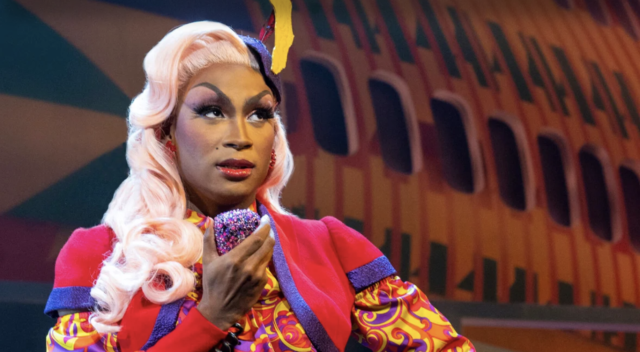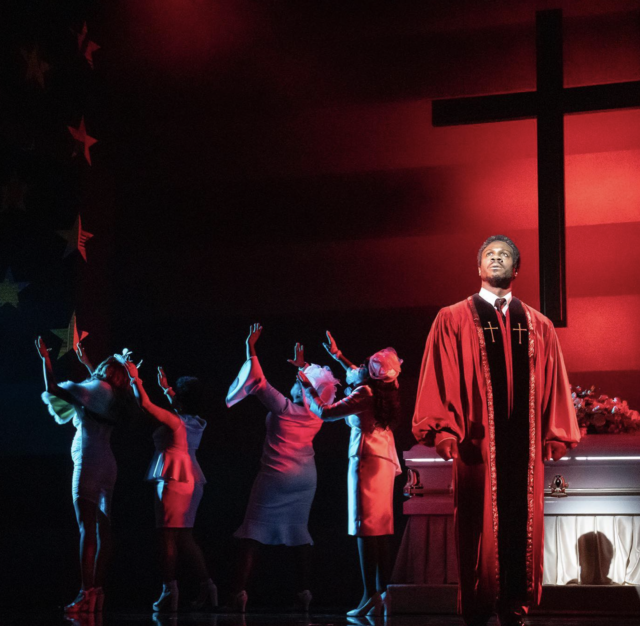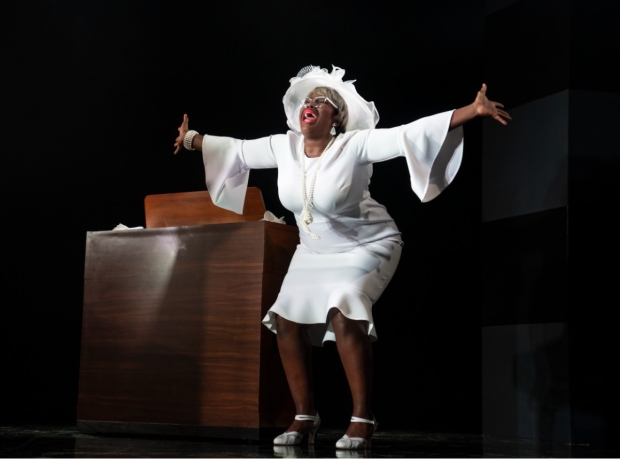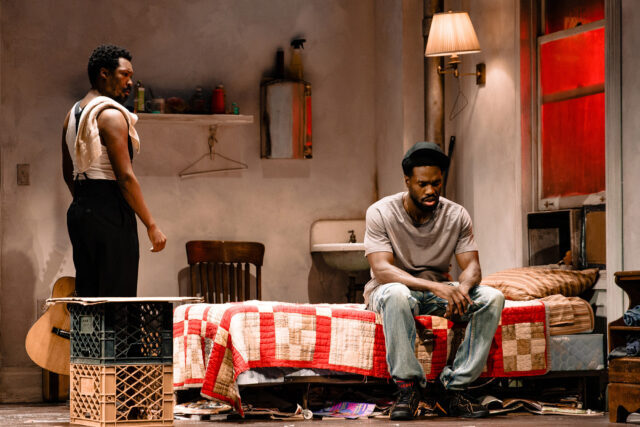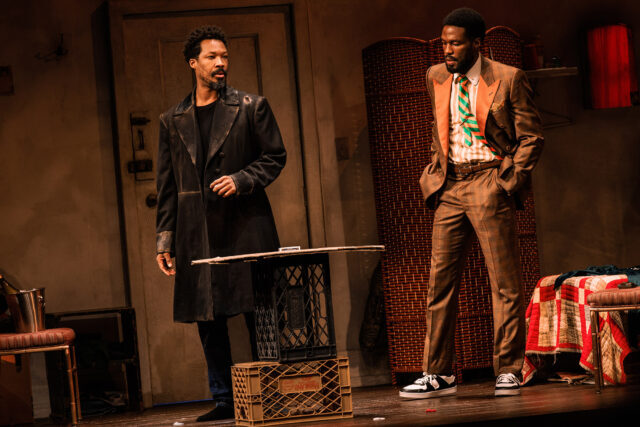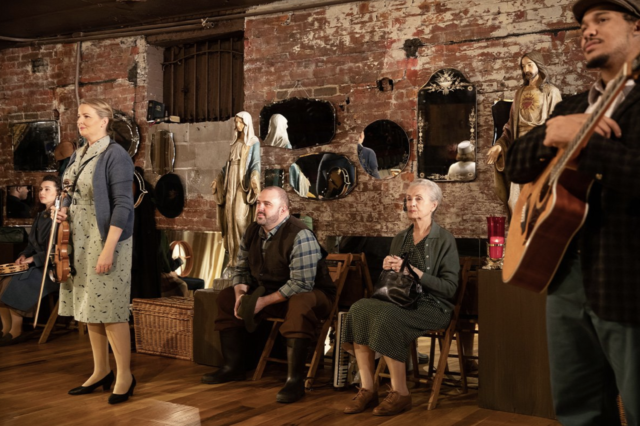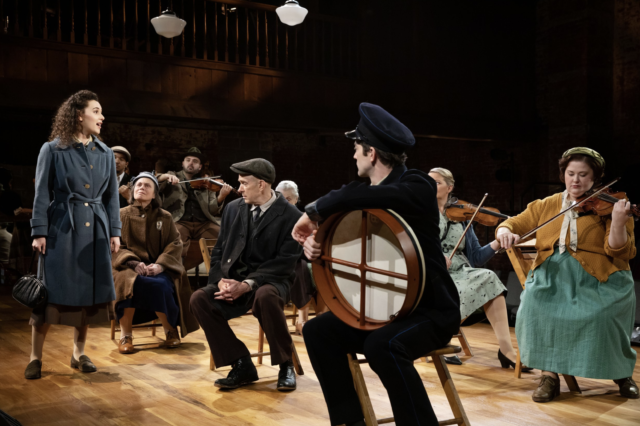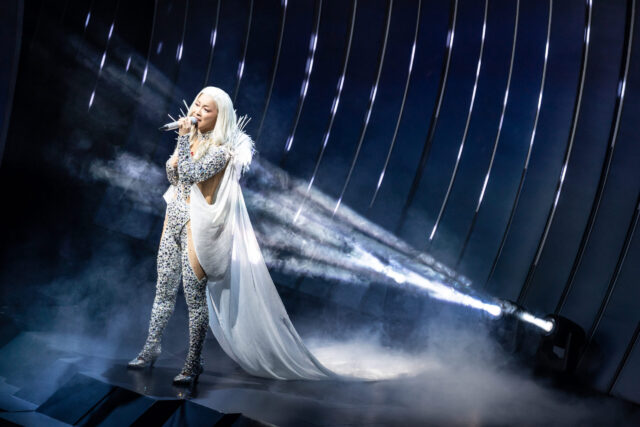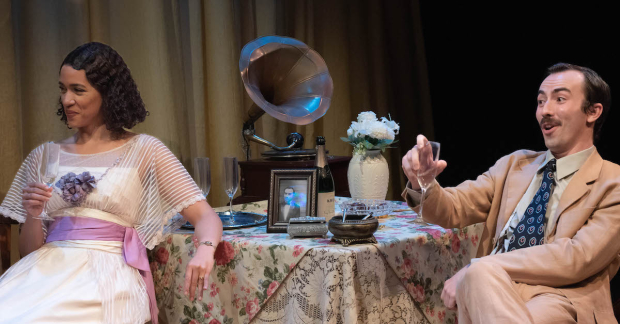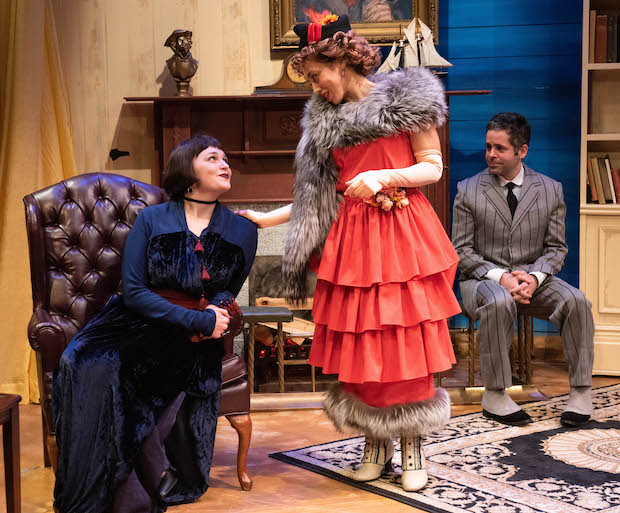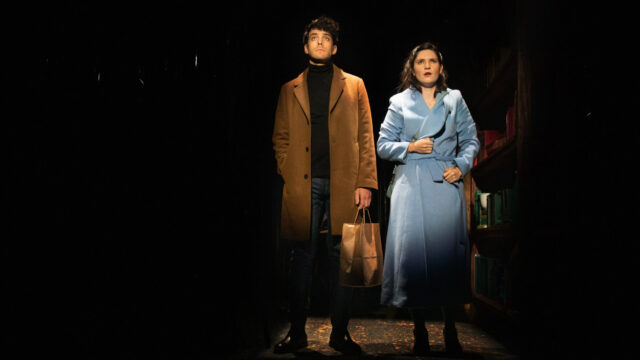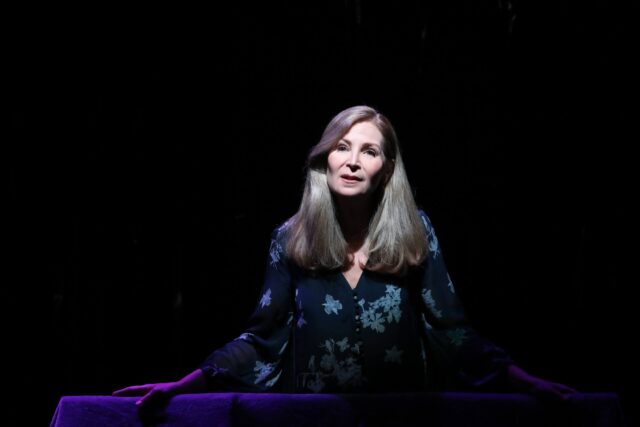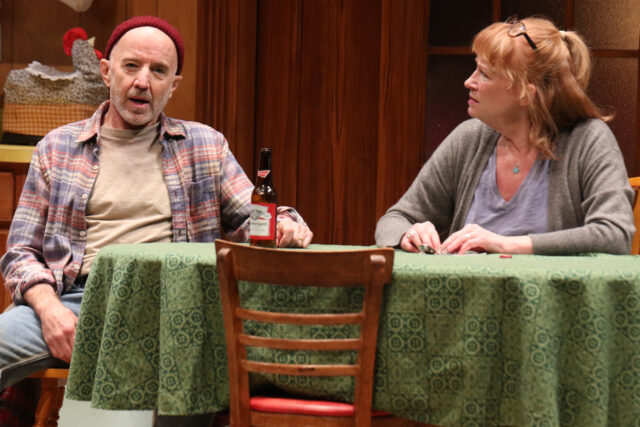
Dan (Arliss Howard) and Marta (Johanna Day) are in for quite a night in Des Moines (photo by Hollis King)
DES MOINES
Theatre for a New Audience, Polonsky Shakespeare Center
262 Ashland Pl. between Lafayette Ave. & Fulton St.
Tuesday – Sunday through January 8, $97
866-811-4111
www.tfana.org
Denis Johnson’s Des Moines is a sly, beguiling black comedy about — well, I’m not quite sure what it’s about, but I couldn’t take my eyes off it, and not in a car-wreck sort of way. The 2007 play opened Friday night at TFANA’s Polonsky Shakespeare Center, but director Arin Arbus started working on the play with Johnson, the German-born novelist who died in 2017 at the age of sixty-seven, way back in 2013. In a program note, TFANA founding artistic director Jeffrey Horowitz explains that in 2015, after a week of workshopping with Arbus, the author, and dramaturg Jonathan Kalb, he told Johnson he “felt the play needed more clarifying. Denis said ‘no.’ Des Moines was finished.”
Now that I’ve seen its off-Broadway premiere, which continues through January 1 in Brooklyn, I am thrilled that Johnson refused to make any changes; clarification would have denuded the hundred-minute work of its endless charms and purposefully chaotic confusion. The characters speak in non-sequiturs, as if they are not listening to one another while engaging in what are generally called conversations. They go off on tangents or suddenly fall into silence. “It’s just kind of a little bit weird,” Marta (Johanna Day) understatedly says.
The play takes place in an upstairs apartment of a two-flat building in the capital of Iowa, whose caucuses have traditionally kicked off the presidential primary cycle, a city steeped in the insurance industry and whose name translates from the French as “of the monks.” The Online Etymology Dictionary posits that the name Des Moines grew out of the Native American word “Moinguena,” explaining, “Historians believe this represents Miami-Illinois mooyiinkweena, literally ‘shitface,’ from mooy ‘excrement’ + iinkwee ‘face,’ a name given by the Peoria tribe (whose name has itself become a sort of insult) to their western neighbors. It is not unusual for Native American peoples to have had hostile or derogatory names for others, but this seems an extreme case.” Now, I’m not claiming that Johnson knew any of this, but it feels like it fits in with the show’s exhilarating bathos.
The apartment hovers in midair, with space above and below it, as if it is a kind of floating bardo, way station, or purgatory. Riccardo Hernández’s comfy set includes a standard kitchen with a working sink, microwave, and coffeemaker, tchotchkes on the walls and counters, a small table in the center, two empty metal dog bowls, a garbage can, and a back room behind sliding French doors. Things are a little wilder and less ordinary in the back room, which is drenched in erotic red lighting.
The apartment belongs to the soft-spoken Dan (Arliss Howard), a twenty-year Army veteran who now drives a cab, and his wife, Marta, a relatively simple couple with simple needs, happy with leftover spaghetti and mediocre beer. They are taking care of their late daughter’s daughter, Jimmy (Hari Nef), who lives in the back room, confined to a wheelchair after a botched trans surgery.
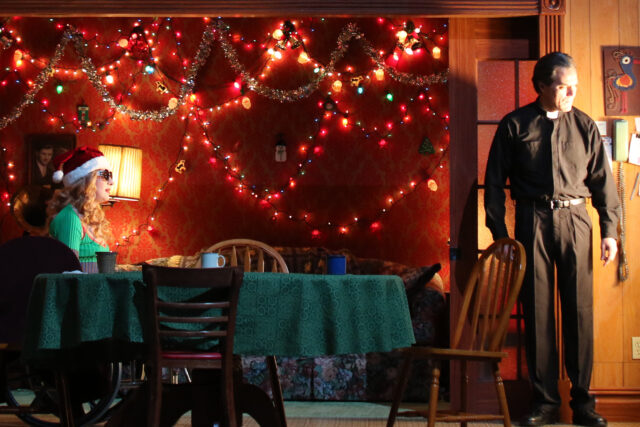
Jimmy (Hari Nef) and Father Michael (Michael Shannon) get ready for a party in Denis Johnson’s final play (photo by Hollis King)
On this particular night, Marta has asked their parish priest, Father Michael Dubitsky (Michael Shannon), to come over and be there when she gives Dan some important news; Dan has some important news of his own about Michael, who he saw wearing lipstick outside a gay bar. Meanwhile, Dan is expecting the recently widowed Helen Drinkwater (Heather Alicia Simms) to stop by to pick up her late spouse’s wedding ring, which she left at the garage where Dan works. Her husband, a lawyer, died in a commuter plane crash; Dan had driven him to the airport, so Helen is hoping that the taxi driver will remember something that her husband said, what might have been his last words.
Once everyone is there, depth chargers — the drink in which a shotglass of alcohol is dropped into a mug of beer — are flowing, music is playing, and anarchy ensues as everyone and everything spirals out of control in a party to end all parties, the kind of crazy fete that is best experienced from a distance, like safely ensconced in seats in a theater, with additional physical space between the audience and the set.
Des Moines evokes the classic Twilight Zone episode “Five Characters in Search of an Exit,” in which a clown, a soldier, a ballerina, a hobo, and a bagpiper are trapped in an unknown, inescapable pit. The five characters in Johnson’s play seem trapped as well, if not in the apartment itself then in the city of Des Moines. Dan, who was stationed a few blocks from where he was born, has never been west of town, while it’s his job to take people to other places, including airports, where they travel away from Des Moines. Jimmy is confined to a wheelchair and appears to have no desire to go anywhere, especially after what happened to her when she went to the fictional Barrowville, West Virginia, where she got her problematic sex change operation.
And Ellen, who has lived in Des Moines “always and forever,” is widowed because her husband died on a commuter plane that only made it eight miles upriver before crashing, four miles from the fictional Sheller-Phelps factory, perhaps named after Phelps Sheller, a real-life Illinois farmer and military veteran who worked at the Sangamon Ordnance Plant, which manufactured ammunition during WWII.
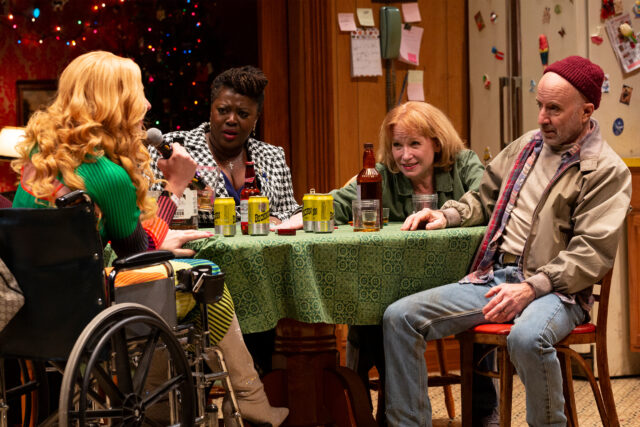
It’s time for depth chargers and karaoke in off-Broadway premiere at TFANA’s Polonsky Shakespeare Center (photo by Hollis King)
Time is irrelevant in Des Moines. Father Michael forgot to turn his clock back to standard time. Ellen doesn’t know whether it’s Halloween or Christmas, confused by the holiday decorations in Jimmy’s room, which has both an antique phonograph with a large horn and a karaoke machine, mixing past and present. Dan and Marta can’t remember whether their dog ran away one winter ago or two, but they still leave two empty dog dishes on the floor as if the pooch just went out for a walk. Father Michael says several times that he hardly recognizes the old neighborhood even though he’s there all the time.
While no one in the apartment is living the American dream, dreams play a major role in the narrative, which is so helter-skelter, so disorganized that it sometimes seems like various scenes are actually dreams we are experiencing through the dreamer’s memories. Dreams are referenced throughout the show. Dan asks Father Michael to yell at him when he least expects it, “Wake up! You’re dreaming!” The first time we see Jimmy, she says, “I woke up. I was somewhere beautiful in a dream.” Ellen tells Dan and Marta, “I’ve been having some very strongly vivid dreams just lately.”
Not everyone likes listening to other people’s dreams. In the 2017 Scientific American article “Why You Shouldn’t Tell People about Your Dreams,” cognitive science professor Jim Davies delves into “why most of your dreams are going to seem pretty boring to most people.” But made-up dreams coming from the mind of Denis Johnson, well, there’s nothing boring about that.
Two-time Tony nominee Day (Sweat, How I Learned to Drive), Howard (Mank, Joe Turner’s Come and Gone), Nef (“Daddy,” Assassination Nation), Shannon (The Killer, Frankie and Johnny in the Clair de Lune) and Simms (Fairview, By the Way, Meet Vera Stark have a field day in Des Moines, National Book Award winner Johnson’s (Jesus’ Son, Tree of Smoke, Hellhound on My Trail) last play. The actors appear to be having so much fun as the the story descends more and more into madness, and that energizes the audience. Obie winner and Shakespeare veteran Arbus (The Skin of Our Teeth, Frankie and Johnny in the Clair de Lune) maintains an ecstatic anarchy throughout the proceedings, with gleeful choreography by Byron Easley.
“I dreamed I was in this weird place,” Dan says the morning after the party. “It was a strange place. I’m trying to remember the kind of place it was, but I can’t remember.” That’s kinda the way I feel about the show, which I will long remember.
